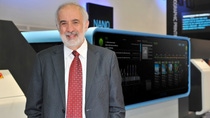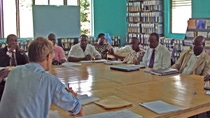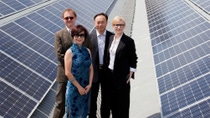Chi siamo
The bridge builder

Israel is a country riven with social and economic differences. But an education fund set up by the entrepreneur Benny Landa and his wife Patsy aims to bring about positive change. By offering underprivileged young people the chance to study, Landa hopes to foster greater understanding among the different communities that make up this vibrant land.
A visionary inventor who holds more than 700 patents, Benny Landa loves the tiny details that go into achieving big things. A new printing process devised by his company, Landa Corporation, uses ink made of pigment particles only a few nanometers across – compared to around 100,000 for a human hair. This nanotechnology printing stands to be as revolutionary as digital offset color printing, something Landa’s first company, Indigo, pioneered in the 1990s.
When he is not fine-tuning systems in Landa Corporation’s high-tech compound near Tel Aviv, the restless entrepreneur pursues a very different big dream: the bridging of socio-economic gaps in Israeli society. “When you grow up poor like I did, it has a profound effect on you,” says the Canadian-bred Landa. “You appreciate the contrast between having the freedom to do things, and having to make do.”
Born to Holocaust survivors in Wrocław, Poland, after the end of the Second World War, Landa emigrated with his parents to Edmonton, Canada, in 1948. His father, a carpenter, bought a tobacco shop and added a little studio to make passport photos. It was equipped with a camera that was remarkable for the time because it captured images directly on paper, rather than film – giving the young Benny a life-long appetite for innovation.
After studying in Israel and England, Landa left Canada with his wife Patsy and moved to Israel permanently in 1974. For many years, Landa says he was so deeply immersed in running his business, Indigo, that he did not think about much else. “When I sold the business to Hewlett-Packard in 2002, I finally got my head above water and was actually quite shocked by what I saw – an Israeli society with great social injustices, great inequalities,” he says.
The very same year, Landa and his wife founded the Landa Fund for Equal Opportunity Through Education, which channels a yearly donation through Israel’s seven universities and a number of non-profit organizations. The fund aims to narrow socio-economic gaps by helping young people with “privileged minds and underprivileged means” get a higher education. In so doing, it also aims to promote civic equality between Israel’s Jewish and Arab citizens.
Benny Landa and his wife have expended about $50 million through the fund thus far, and their commitment is ongoing. The fund also sponsors non-governmental organizations including Merchavin (“open spaces”), which promotes values of shared citizenship and runs the fund’s Arabic teaching program, and Kav Mashveh (“equalizing line”), a professional placement program for Israeli Arab university graduates. To date, the fund’s activities have enabled thousands of talented, underprivileged youth to get university degrees.
Internationally, Israel enjoys the reputation of an economic powerhouse with a well-trained workforce and vibrant start-up culture. But when Landa took a closer look, he discovered a tale of two societies. “Part of Israel is like Denmark – very advanced, well-educated, a high GDP per capita and a high standard of living. But we have a second economy which is more like El Salvador – poor, large families, less education and a much lower income.”
Statistics confirm that most of the disadvantaged citizens are Israeli Arabs, who make up one-fifth of the country’s population, and immigrants from countries as diverse as Russia and Ethiopia. “This situation is not sustainable. No country can leave large segments of its own society behind,” Landa adds.
Under the Landa Fund programs, each participating university is required to track students, report how they do compared to others, and to monitor the drop-outs. The institutions that get the best results are rewarded with greater resources. “We run it like an investment, in every way,” Landa says. Overall, the results have been “outstanding” with most students on the roster performing above the scholastic average.

Milestones of Benny Landa’s career
1946
Benny Landa is born in Wrocław, Poland.
1971
He co-founds the company Imaging Technology (Imtec) located in the United Kingdom.
1977
Landa founds Indigo in Rehovot, Israel. The company develops and manufactures digital offset printing presses.
1994
Indigo is listed on NASDAQ.
2002
Hewlett-Packard acquires Indigo. Landa Corporation and the Landa Fund for Equal Opportunity Through Education are founded.
2012
Landa unveils his nanographic printing systems at drupa trade fair.
Social investment
“We don’t call it philanthropy. We call it social investment,” says Landa. “The payback isn’t in dollars or euros, it’s in intangibles, but it’s the best investment in town.”
It has, for example, changed the life of Mahmud Mahamid, an Israeli Arab studying materials engineering at Ben-Gurion University, who at one time could not even afford the bus fare to school. Luana Gutman, a Russian Jewish immigrant enrolled in medical laboratory sciences, endured great personal privation before winning a Landa scholarship. “For these kids, it’s like a gift of life,” enthuses Landa. “They are so motivated to show that the faith we have in them is well-placed.”
Sharing culture and values
Landa is ambitious in his aims and, although the fund has attracted much praise, he is still not satisfied with its achievements. He is therefore broadening its focus to include “existential and cultural gaps” between Israeli Arabs and Jews. Through Technion, the prestigious Israel Institute of Technology, the Landa Equal Opportunities Project provides health services as well as academic preparation to Israeli Arab high school students in the north. The fund also sponsors programs to teach Israeli children Arabic. Landa reasons that only if you speak the same language can you grasp the culture and values of others – something that will foster compassion and understanding between the country’s Jews and Arabs.
“Many people think the biggest threat to Israel is exogenous. I don’t think that at all,” says Landa. “Societies fragment from a lack of equal opportunity, not from an outside threat.”
BASF Stiftung improves business perspectives for Africa’s youth
Sun-kissed Kenya boasts some of East Africa’s most gorgeous landscape. The economy, on the other hand, is failing to live up to its potential. A staggering 80% of all those unemployed are young people aged between 15 and 34, according to a recent UN Development Programme report.
Better education is part of the solution. A joint project, Student Training for Entrepreneurial Promotion (STEP), teaches aspiring entrepreneurs how to start and run their own business. The initiative is supported by the German Commission for UNESCO, the University of Lüneburg, Germany, and BASF Stiftung, a charitable foundation based in Ludwigshafen, Germany.
Last year, more than 200 students at Kenyatta University in the capital, Nairobi, took STEP courses in management, accounting, marketing and business law. Similar training was given to 200 students in Uganda.
“It is impressive to see how much energy and creativity the students put into their business,” says Peter van den Hoek, Managing Director of BASF East Africa in Nairobi. “This entrepreneurial spirit will ensure markets continue to develop in Africa.” In future, universities in Kenya and Uganda will conduct the program themselves.

